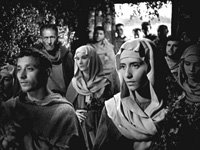NOTE: THIS ENTRY HAS BEEN SALVAGED FROM THIS SITE AND REPOSTED UNEDITED ON 6/18/2010. SOME INFORMATION MAY BE OUTDATED, AND OUTGOING LINKS HAVE NOT BEEN INSPECTED FOR REPUBLICATION. COMMENTS CAN BE FOUND HERE.
* * * * *(With sincere apologies to Jonas Mekas)

Did you know the
Rafael Film Center has put out its latest calendar? That they're playing Roberto Rossellini's beautiful
the Flowers of St. Francis for four days in early August? Did you know that Guy Maddin's latest short film, a tribute starring the neorealist's daughter Isabella called
My Dad is 100 Years Old, will be paired with the 1950 classic at each screening?
Did you know the Rafael is showing
American Graffiti for free this Saturday at 11AM? And that it's the Frisco Bay venue for both the
indieWIRE: Undiscovered Gems series and the
Sundance Institute Art House Project? Did you know that the Sundance Institute is celebrating its 25th anniversary this year, and that they're bringing to the Rafael prints of films like Allison Anders's
Gas Food Lodging this July 9, Charles Burnett's
To Sleep With Anger July 23, and Rob Nilsson's
Heat and Sunlight August 2nd?
Did you know the Rafael also hosts the
Mill Valley Film Festival October 5-15? And that they're warming up with a series called
Global Lens starting September 21? And that they're also one of the venues for the
Jewish Film Festival? Did you know that Israeli director Amos Gitai is receiving an award from the SFJFF this year? Did you know that I've never seen a single one of this Cannes regular's films? Or that I'll have a chance to remedy that situation on July 23 when the
Castro plays
House,
News From Home/News From House and
Free Zone, with several other opportunities to see those films in Berkeley, San Rafael and Mountain View in the subsequent weeks?
Did you know that the
Silent Film Festival will be hosting a free event called
Amazing Tales From the Archives on July 16th at 11AM, just before the 12:30 Castro screening of three Laurel and Hardy films directed by the entirely underrated Leo McCarey? Did you know that film archivists are my personal heroes, and yours too if you like seeing beautiful (or even halfway decent) prints of our cinematic heritage? Did you know that children 12 and under are admitted to all SFF events this July 14-16 for free?
Did you know that the
Stanford Theatre is almost as wonderful a place to see a silent film as the Castro is? And that they're playing four silent films on Friday evenings as part of their newly-announced Summer schedule packed with Hollywood classics? That one of them is G.W. Pabst's second film made with Louise Brooks,
Diary of a Lost Girl on August 4? And, of course, that this is the perfect compliment to the July 15 SFF screening of that pair's first collaboration,
Pandora's Box, which will be preceded by rare trailers for lost Brooks film
the American Venus?

Did you know that the
Balboa Theatre is hanging onto the print of Jean-Pierre Melville's
Army of Shadows for at least one more week? But that tomorrow is the last day to see
Iron Island at the
Roxie or
the Death of Mr. Lazarescu or
Lady Vengeance at the
Lumiere? Did you know that I consider the latter film the most fascinating of Park Chan-wook's vengeance trilogy, combining the emotional trial-by-fire of
Sympathy For Mr. Vengeance with judicious flashes of
Oldboy-style narrative and visual gimmickry, with a final reel or two both shocking and self-critical?
Did you know that
Artists' Television Access has
all sorts of interesting-looking programs coming up? That the makers of the extremely controversial 9/11 documentary
Loose Change will be at the
Four Star July 13 to show the film and, hopefully, answer audience questions? That the
Lark Theatre will be broadcasting the World Cup Final between France and Italy this Sunday at 11 AM? Or that the
Edinburgh Castle will be as well? Did you know that the latter will also be the venue for a screening of a set of road movies by Frisco filmmakers on Monday, July 24? That it's free?





































